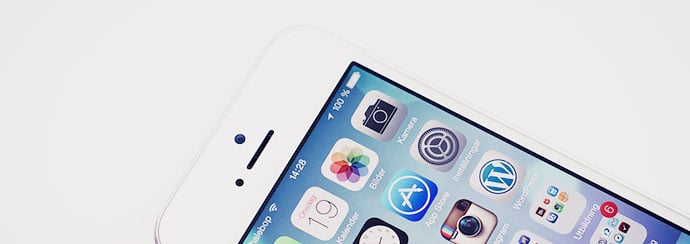Android vs iOS: What Comes First?
Together, the titans of Apple and Android dominate the smartphone market share, accounting for over 90%. So it’s no wonder that, if you’re interested in building an app, you can’t look past the big two. But wait… They use completely different operating systems AND are developed in different languages?! UGH. Basically, there’s a critical decision to be made here:
Where do I launch my app first?
Let’s dig into the stats, weigh them both up equally and give you the clairvoyance to make the best choice for your app launch. Shall we begin?

Launching for Android First
A bigger market?
Currently, there are over 1.4 billion active Android users worldwide, which is nearly 3 times the amount of iOS users. This can be hugely enticing for new app developers because, ipso facto, more users = more downloads = more profit, right? Well, not always. Unfortunately for Android, this doesn’t tell the whole story for two main reasons:
- The majority of Android users are based in lower income areas and developing countries.
- Even though Lollipop has recently become the most popular operating system on Android, it is still only used by 36% of smartphones.
This means that if you decide to develop for Android, to reap the benefits of the bigger audience, you will have to spend more time developing for the other operating systems too, such as KitKat, Jelly Bean and Marshmallow. And, surprise surprise, costs will increase as you spend more time developing for different systems.
See our guide below to find out what you need to do in your post mobile app launch process.
Speed to market
In contrast to the manually tested Apple Review system that can take several iterations and still be rejected for (what seems like) pernickety reasons, Android’s Google Play offers a more liberal and speedier approach. So, if you have a competent developer at hand with an app idea in mind that is time dependent, then you may have a better chance of getting it on the market before your Apple iOS competitors.
Freedom!
There’s no doubt that the more flexible operating system is Android and, consequently, many out-and-out developers prefer it because they feel they can express their creative side more freely. The rules and regulations employed by iOS’s Xcode and enforced by the Apple Review Members can frustrate you and your developer’s design vision and force you back to the digital drawing board.
But...Fragmentation
When talking about Android apps, the most common grievance we come across surrounds fragmentation. Simply, fragmentation refers to the fact that Android devices come in all different shapes, sizes, hardware specs and performance levels. For that reason, if you want to reach the widest possible audience, you must test your app on each different variant, which makes it incredibly challenging for your developer and draining on your budget. The more devices and performance levels there are, the more time it will take to develop and test.

Launching for Apple iOS First
Reaches a larger percentage of iOS users
Unlike the rather sporadic operating systems that exist on Android smartphones, the users of its fruity counterpart have a much more stable audience. As of January 2017, Apple posted a 76% adoption rate of iOS 10. This makes developing your app simpler and quicker with fewer bugs to worry about.
Reduced Development Time
Due to the fragmentation malarkey over on Android, development and test typically takes longer than the same app on iOS and therefore can cost more than it’s iOS counterpart.. Because of Apple’s comparatively simple platform, you’re also less likely to experience major teething issues, particularly as it’s put through the rigorous tests by Apple experts during the review.
The review process can be rather helpful, too, if you’re a newbie to the app developing scene. Having objective experts manually test your app before putting it on the market can be a little bit like getting an award winning writer to feedback on your novel before it’s published - sure, it may take longer, but it’ll probably be worth it.
Making your money back
In terms of seeing a considerable return for your investment, there really is only one winner. Apple iOS dominates the profit share, generating 85% more revenue for app makers than Android. The spending power of an Apple user is almost five times higher than an Android user and this can be seen from the increased in-app purchases, and the popularity of Facebook Ads comparatively. In fact, Mobile ads on iPhone generate 1790% more ROI than ads on Android.
So what’s the verdict?
For app makers who don’t have much experience, Apple iOS seems to be the safer option to launch on for a timely, cost-effective and relatively frustration free lift-off. However, it does absolutely depend on where your audience is. For example, if you’re developing your app for a whose market is in Asia or the USA, it would make much more sense to launch on Android first. This may mean you need to brace yourself for a lengthier development process but by partnering with experienced developers right from the beginning, you can reduce the hiccups that often occur and enjoy the freedom that Google Play offers.
Need some tips on making your app a success post launch? Download our free eBook now!
Image credit: Kārlis Dambrāns, Olle Eriksson
DP
Related Posts
Got a project? Let's work together
Compsoft is a remote working company except for Thursdays when we work together from the Alton Maltings in Alton, Hampshire (UK). Our registered address is detailed below. We'd be delighted to have either a virtual chat with you or to make arrangements to meet in person.

